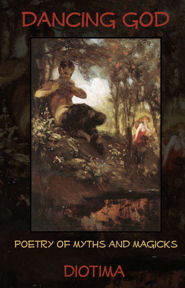
To write poetry and then put it before the eyes of another is an act of courage. To write poetry and put it up as an offering to the gods is something more than courage; in that act lay the madness of true love. Poetry, while exalted as a romantic art, generally comes crashing down from its creative clouds when confronted with the way mortals receive a poem – they can’t see the context of the heart which wrote it. To make this soul-shaking exposure even more difficult, very few people know how to read a poem these days. All too often such reading is followed by someone saying “I don’t get it.” While it’s evident that Diotima is still pursuing her poetic voice and that the song of inner rhythm has some maturing to do, she’s coming from a place in her soul that needs to speak – and over the years I wish fervently on her behalf that she truly find her song.
While it is unlikely that a reader can relate to every poem in Diotima’s deeply personal Dancing God, it is possible to glimpse the complex relationships polytheist priestly types encounter: even while longing for ordinary love and comfort, both priest and mortal consort must ever make room for that third, divine presence that overwhelms them all. The best work in the book comes at the front: the poetical story of how the bard-god Bragi met his magpie delights, and “Earth, Air, Fire, Water” begs to become a ritual call. Certainly the magical element of Diotima’s poetry has by far the most power: many of the poems read as invocations and prayer, most of which somehow speak to the interaction between priestess and deity.
Unfortunately, the later passages of the book lose their inspiring initial thread. The subjects of the later poetry, largely focused on difficult interpersonal relationships, seem to lose both structure and strength as the writer tools with rhyme forms that don’t necessarily work and where the poem is essentially a monologue absent the imagery and metaphor required to create quality verse. Poems about daily life are be default more difficult to write than are poems to exalt the spirit: when creating poems unto the gods, the metaphors line up before you, one god-symbol after another. But to find your own metaphors in the day-to-day of your personal story and experience requires digging into yourself to the point of near self-mutilation.
The Dancing God is first and foremost, very brave. The first section of poems will find wonderful further life spoken aloud at circles and used as invocations and spell chants. The later poetry that has a less spiritual and more personal bent may (or may not be) exactly relatable and suggests that Diotima has quite a bit to say about life and living that’s still cooking yet.
~review by Diana Rajchel
Author: Diotima
CreateSpace, 2008
pp. $15.99
